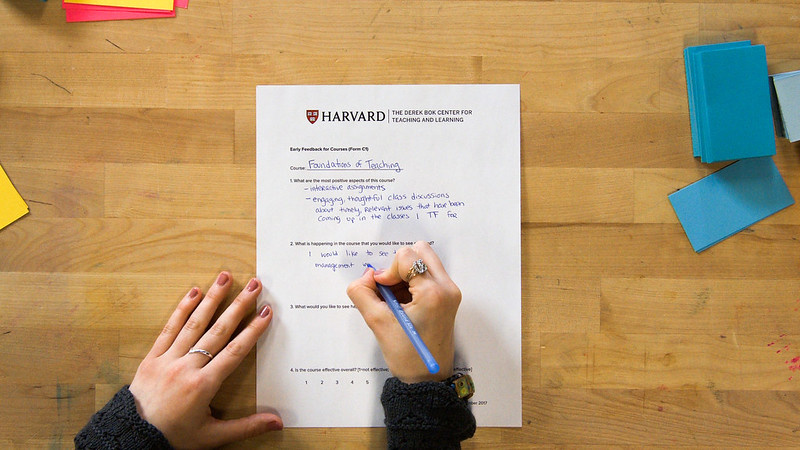 It is important to stay in touch with your students: what they are learning in your class, and how they are experiencing it. When we meet with instructors who have received critical feedback in their final course evaluations, it often becomes clear that they may have been able to address their students' concerns by making small adjustments in the course—if only they had known more, sooner, about their students' experiences. Feedback also helps instructors learn more about their own teaching. We strongly encourage all instructors to solicit early feedback from their students, and we are happy to meet with instructors either to discuss ways to solicit feedback, or to interpret the results which they receive. Early feedback results can also be helpful in conjunction with a classroom observation / video viewing to give an instructor a fuller picture of what is happening in the classroom, similar to triangulating data in research.
It is important to stay in touch with your students: what they are learning in your class, and how they are experiencing it. When we meet with instructors who have received critical feedback in their final course evaluations, it often becomes clear that they may have been able to address their students' concerns by making small adjustments in the course—if only they had known more, sooner, about their students' experiences. Feedback also helps instructors learn more about their own teaching. We strongly encourage all instructors to solicit early feedback from their students, and we are happy to meet with instructors either to discuss ways to solicit feedback, or to interpret the results which they receive. Early feedback results can also be helpful in conjunction with a classroom observation / video viewing to give an instructor a fuller picture of what is happening in the classroom, similar to triangulating data in research.
Request a feedback consultation
How Should I Collect Feedback?
There are many ways in which instructors can receive frequent, early, and low-stakes feedback on how their students are learning. These range from "minute papers" jotted down at the start or end of class to more formal midterm feedback surveys distributed in-class or online, like those available through Blue. We discuss a variety of these techniques in our Online Resource pages on early or midterm feedback (which features six downloadable, ready-to-use forms) and ongoing feedback. You can also refer to our quick-start Bok Guide: How do I use feedback to improve my teaching? for more details about the why and how of getting feedback from your students.
Visit our online resources on feedback
How Should I Interpret My Feedback?
After you solicit feedback you must then try to make sense of it, and develop a plan to respond to it that is appropriate for your course. It may be challenging when you receive conflicting feedback; you will need to consider the feedback in light of your own perceptions of the course, and you may also want to request a class observation in conjunction with the feedback in order to get an impartial perspective. Bok Center staff are happy to sit down with you to process your feedback.
Request a feedback consultation
How Can I Put My Students' Feedback into Perspective?
It may also be helpful to have an extra set of eyes on what's happening in your classroom. While student feedback can tell you a lot about how students are experiencing your teaching, inviting a consultant to observe your class can help give you a fuller picture of your course.
